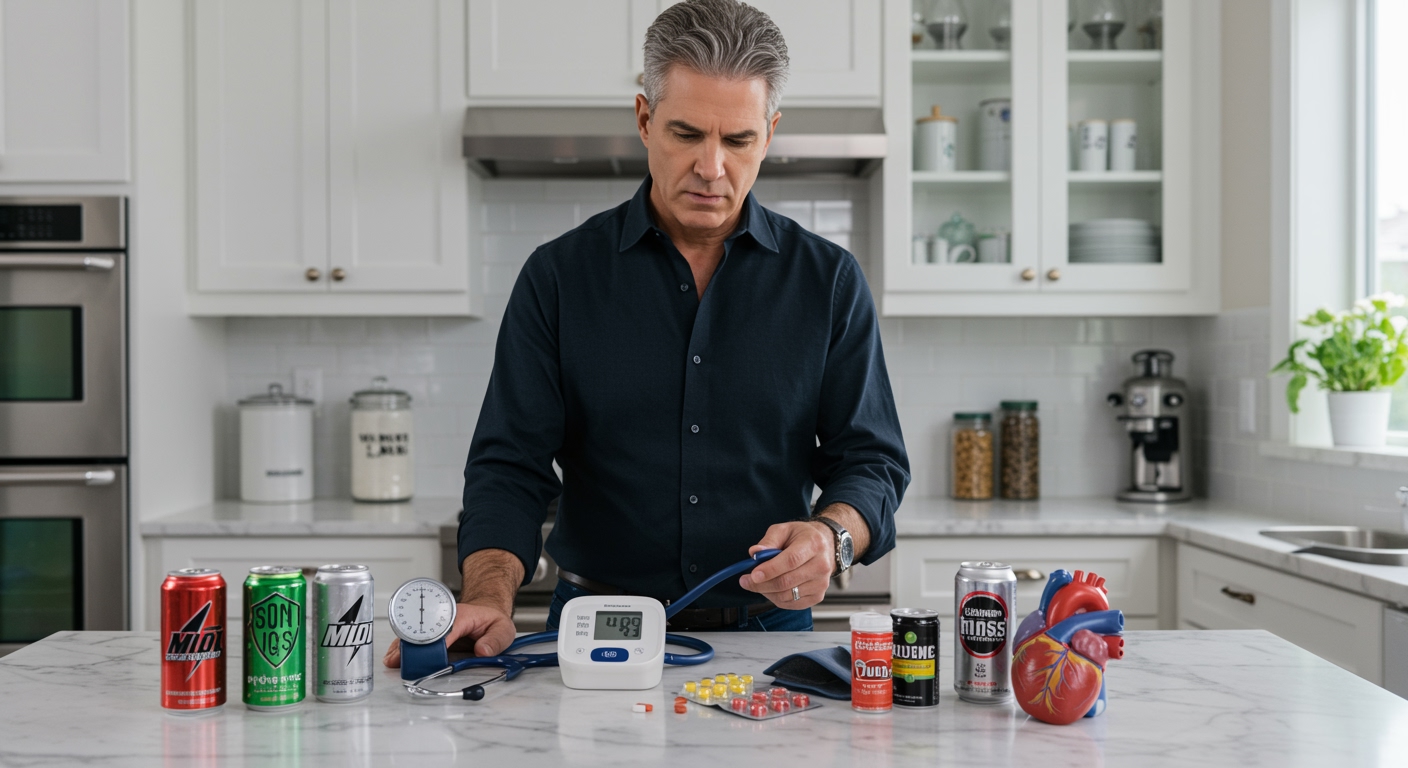✪ Key Takeaway: People with hypertension should avoid energy drinks as they can raise blood pressure by 15-20 points within hours.
Introduction
Your heart pounds faster after drinking that energy drink, and you wonder if this feeling is normal or dangerous.
You might be asking this question because you have high blood pressure and need energy for work, exercise, or daily activities, but you are concerned about the health risks.
Hi, I am Abdur, your nutrition coach, and today I am going to explain why energy drinks pose serious risks for people with hypertension and what safer alternatives you can use instead.
How Do Energy Drinks Affect Blood Pressure?
Energy drinks contain high amounts of caffeine that directly impact your cardiovascular system within minutes of consumption.
A typical energy drink contains 80-300 milligrams of caffeine, which is equivalent to drinking 2-4 cups of coffee at once.
When you consume this much caffeine, it blocks adenosine receptors in your brain, which normally help you feel calm and relaxed.
This blocking action triggers the release of stress hormones like adrenaline and noradrenaline into your bloodstream.
These hormones cause your heart to beat faster and your blood vessels to constrict, which increases blood pressure significantly.
Research shows that energy drinks can raise systolic blood pressure by 15-20 points and diastolic pressure by 10-15 points within 2-4 hours of consumption.
For someone with existing hypertension, this spike can push blood pressure into dangerous territory that increases the risk of heart attack, stroke, and other cardiovascular emergencies.
✪ Fact: Energy drinks can raise blood pressure more than coffee due to additional stimulants like taurine and guarana.
What Other Ingredients Make Energy Drinks Dangerous?
Energy drinks contain multiple stimulant compounds that work together to create a more powerful effect than caffeine alone.
Taurine is an amino acid that can enhance the effects of caffeine and may interfere with normal heart rhythm regulation.
Guarana is a plant extract that contains natural caffeine, which means you are getting even more caffeine than what is listed on the label.
Many energy drinks also contain high amounts of sugar, often 25-40 grams per serving, which can cause blood sugar spikes.
These sugar spikes trigger insulin release, which can affect blood vessel function and contribute to inflammation in your cardiovascular system.
Some energy drinks include synthetic vitamins in extremely high doses, particularly B vitamins, which can cause side effects when consumed in large amounts.
The combination of all these ingredients creates a synergistic effect that puts extra strain on your heart and blood vessels, making them particularly dangerous for people with hypertension.
✪ Pro Tip: Always read ingredient labels carefully as many energy drinks hide additional caffeine sources under different names.
What Are The Immediate Risks For Hypertension Patients?
People with hypertension face immediate cardiovascular risks when consuming energy drinks that can be life-threatening.
The rapid increase in blood pressure can cause existing weakened blood vessels to rupture, leading to internal bleeding or stroke.
Your heart has to work much harder to pump blood through constricted vessels, which can trigger chest pain or heart palpitations.
Many people with hypertension take medications that can interact dangerously with the stimulants in energy drinks.
Beta-blockers, commonly prescribed for high blood pressure, can be overwhelmed by the massive stimulant load from energy drinks, making your medication less effective.
The combination can also cause irregular heart rhythms, which feel like your heart is skipping beats or racing uncontrollably.
Emergency rooms regularly see patients who experience hypertensive crises after consuming energy drinks, requiring immediate medical intervention to prevent permanent organ damage.
✪ Note: If you experience chest pain, severe headache, or difficulty breathing after consuming energy drinks, seek emergency medical care immediately.
What Are Safer Energy Alternatives For People With High Blood Pressure?
You can boost your energy levels safely without risking dangerous blood pressure spikes by choosing natural alternatives.
Green tea provides a gentle caffeine boost with L-theanine, an amino acid that promotes calm alertness without the jittery effects.
A cup of green tea contains only 25-50 milligrams of caffeine, which is much safer for people with hypertension.
Eating a balanced snack with complex carbohydrates and protein can provide sustained energy without affecting your blood pressure.
Examples include apple slices with almond butter, Greek yogurt with berries, or whole grain crackers with hummus.
Getting adequate sleep, staying hydrated, and taking short walks can naturally boost energy levels without any cardiovascular risks.
If you need caffeine, limit yourself to one cup of regular coffee per day and avoid consuming it late in the day to prevent sleep disruption.
✪ Pro Tip: Try drinking cold water and doing 10 jumping jacks for an instant energy boost that actually helps lower blood pressure.
The Bottom Line
Energy drinks are dangerous for people with hypertension because they can cause immediate and potentially life-threatening increases in blood pressure.
Your health is worth more than any temporary energy boost, and there are many safer alternatives that can help you feel energized without risking your cardiovascular health.
I would love to hear about your experiences with energy drinks or any questions you have about managing energy levels with high blood pressure, so please share your thoughts in the comments below.
References
At NutritionCrown, we use quality and credible sources to ensure our content is accurate and trustworthy. Below are the sources referenced in creating this article:
- American Heart Association: Energy drinks may provide jolt to heart function, blood pressure
- PubMed: Energy drink consumption and its association with cardiovascular disease
- Verywell Health: Do Energy Drinks Raise Blood Pressure?
- PMC: Energy drinks and their impact on the cardiovascular system
- AHA Journals: Energy drink consumption and cardiovascular biomarkers





